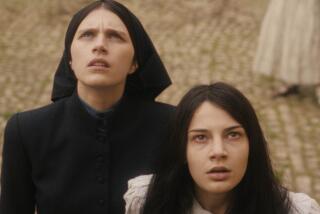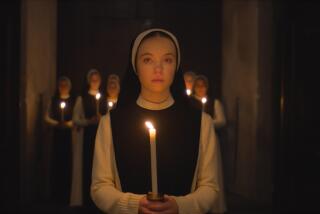Book review: ‘An Unquenchable Thirst’ by Mary Johnson
An Unquenchable Thirst
Following Mother Teresa in Search of Love, Service, and an Authentic Life
Mary Johnson
Spiegel & Grau: 526 pp., $27
It was common in the early part of the 20th century for large Catholic families in the United States to steer one or more children into religious life. Even Catholics in the boomer generation can probably recall being pressed to consider — if only for a minute — becoming a priest or nun.
The majority of Catholics can only wonder what such a life might be like. Mary Johnson’s “An Unquenchable Thirst,” a book about her 20 years as a Missionaries of Charity nun, provides an unusually detailed, frank account that will fascinate not only Catholics but anyone who has wondered about the human capacity to vow lifelong celibacy, poverty and charity.
Johnson was born into a large family in Texas headed by charismatic Catholic parents. As the oldest of several children, she didn’t get a whole lot of attention and saw herself as overweight and unbecoming. But she brimmed with a profound spirituality and compassion for the poor, and when she saw Mother Teresa of Calcutta’s face on the cover of Time magazine in 1975, she heard God calling.
Johnson’s life as a sari-draped nun, when she was known as Sister Donata, was troubled from almost the start. Although she relished her early years in the convent as she worked with children in poverty-stricken American neighborhoods, her superiors recognized her intelligence and put her on a managerial fast-track in the ultra-regimented, secretive Missionaries of Charities order. Far from tending to Calcutta’s poor, Johnson spent most of her years as a nun in and around Rome studying, teaching, writing theological curricula and doing paperwork.
Over time, Johnson began to chafe at the political maneuvering and less-than-holy behavior of her superiors, several of whom she names in the book while disguising rank-and-file nuns and priests with pseudonyms. Even Mother Teresa herself doesn’t escape Johnson’s sharp eye and sense of injustice. While Johnson clearly loved the “living saint” and admired her life’s work, Mother Teresa comes off as a control freak who senses her chance at sainthood under the congenial Pope John Paul II and strictly adheres to the rules set by Rome, including several of the Catholic teachings that have kept women in a place of powerlessness.
Since Mother Teresa’s death in 1997, her writings have surfaced detailing her “dark nights”; years of nagging doubts about God’s presence and the void she felt while building her worldwide ministry. Johnson’s book supports the more-human-than-saint portrayal of Mother Teresa, finding her sincere and hard-working but decidedly businesslike and nonmaternal with her own daughters in Christ.
What overwhelms Johnson, however, is not Mother Teresa but Johnson’s battle against loneliness and the lack of emotional and physical intimacy. Although Missionaries of Charity nuns are forbidden any physical contact — even a friendly hug — Johnson engages in sexual relationships with other nuns on several occasions, including one affair with a sexual predator that the Missionary of Charity leadership knew about but chose to retain on the roster anyway.
An affair with a priest finally pushes Johnson to request exclaustration — leaving the order — although the priest later decides to remain in his vocation and the relationship ends.
Johnson has devoted her years since sisterhood to becoming a writer, and “An Unquenchable Thirst” is engaging, heartfelt and entertaining. She ably communicates why she found religious life appealing and allows readers to understand, bit by bit, how she became disenchanted, needy and sad. She articulates her struggles with her God in words that will hit home with all people of religious faiths.
Only the epilogue is somewhat unsatisfying. Johnson details her years from 1997 to 2007 after leaving the convent and her attempts to resolve some of the emotional debris lingering from the departure. She married and says little of her life as a married writer near the end of the book; the last chapter feels strangely devoid of the central character of the other 505 pages: God. What became of that relationship? Johnson mentions that she rarely goes to church but doesn’t elaborate on the state of her soul. In giving herself so completely to God, did this idealistic and compassionate young woman lose both her vocation and her faith?
More to Read
Sign up for our Book Club newsletter
Get the latest news, events and more from the Los Angeles Times Book Club, and help us get L.A. reading and talking.
You may occasionally receive promotional content from the Los Angeles Times.






